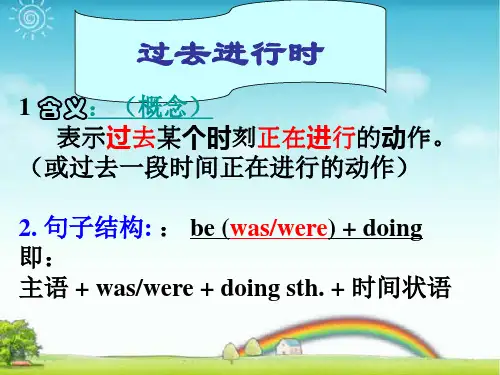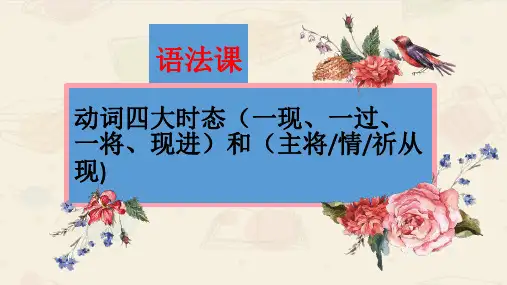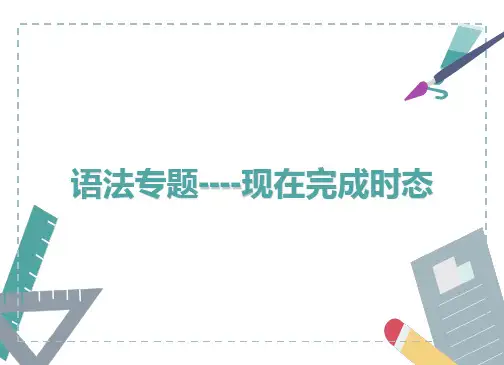英语人教版八年级下册初中英语语法动词时态复习课件1.
- 格式:pptx
- 大小:149.94 KB
- 文档页数:27
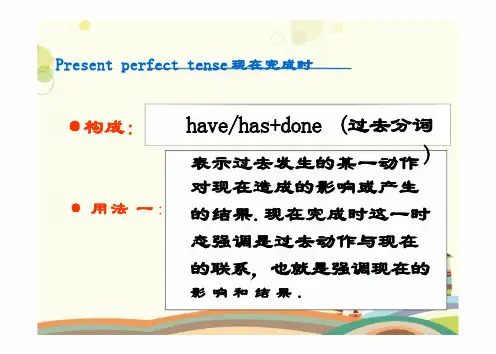
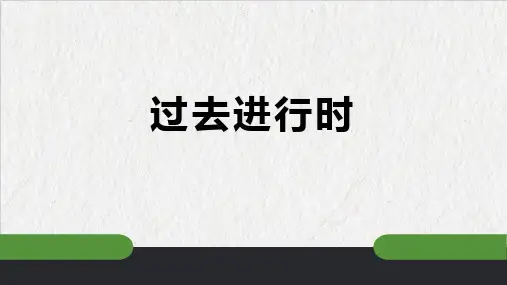
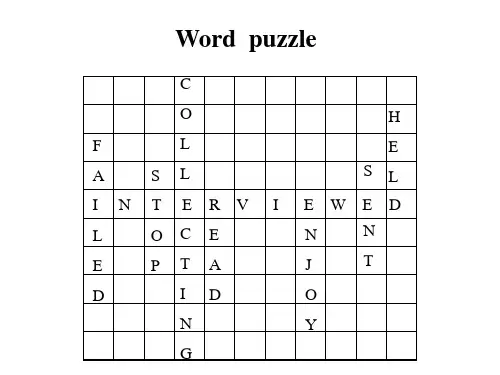
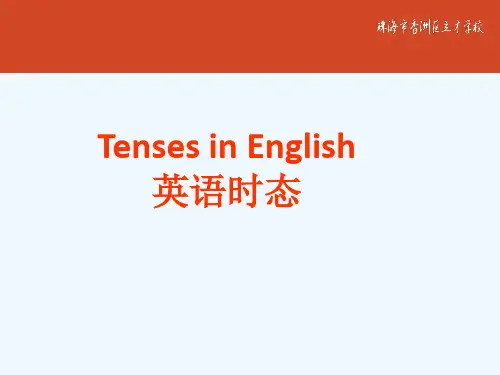
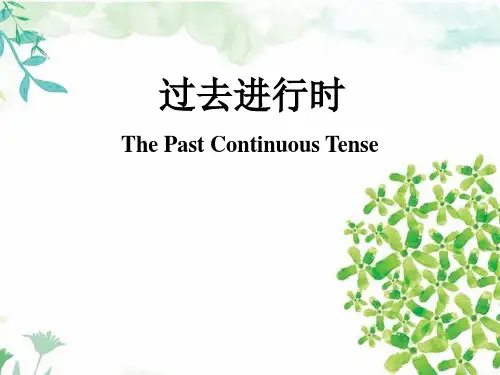

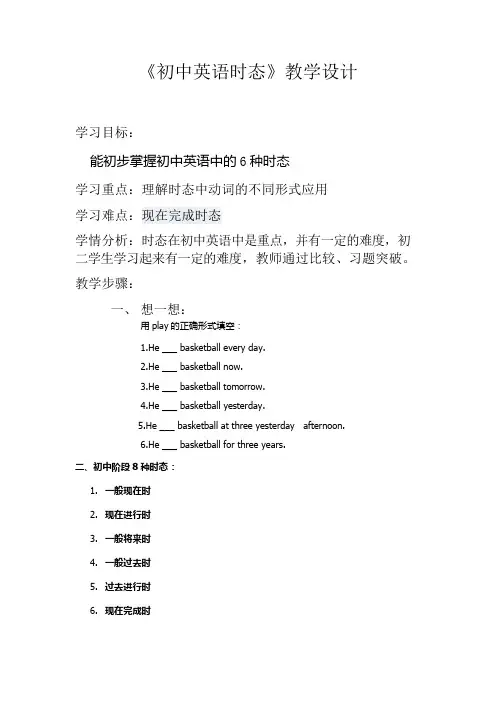
《初中英语时态》教学设计学习目标:能初步掌握初中英语中的6种时态学习重点:理解时态中动词的不同形式应用学习难点:现在完成时态学情分析:时态在初中英语中是重点,并有一定的难度,初二学生学习起来有一定的难度,教师通过比较、习题突破。
教学步骤:一、想一想:用play的正确形式填空:1.He ___ basketball every day.2.He ___ basketball now.3.He ___ basketball tomorrow.4.He ___ basketball yesterday.5.He ___ basketball at three yesterday afternoon.6.He ___ basketball for three years.二、初中阶段8种时态:1.一般现在时2.现在进行时3.一般将来时4.一般过去时5.过去进行时6.现在完成时7.过去完成时(暂时不做要求)8.过去将来时(暂时不做要求)一、一般现在时:1.表示经常反复发生的动作.e.g. They often spend their holidays in the south.常搭配的时间状语:always often usually sometimesseldom(很少) never from time to timeevery day every …. once a week2.表示状态:e.g. He is busy at the moment.3. 表示客观真理,谚语,格言.e.g. The sun rises in the east.4. 用与时间或条件状语从句中, 代替一般将来时:e.g. I will be happy if you come.We will go when he comes.二、现在进行时1.表示说话时正在进行的动作.e.g. He is playing basketball.2. 表示目前一阶段正在进行(但说话时不一定在进行)的动作:e.g. We are preparing for an examthese days.一般现在时与现在进行时的区别1.进行时强调动作正在进行,而现在时强调动作的经常和反复,或特征,这类动作没有时间性的.2.某些表示感官知觉的动词如: see, hear, smell, taste等表示感觉,用一般时,不用进行时.e.g. Can you see a plane in the sky?注意:1) feel 可以用一般时和进行时表示说话时的感觉:e.g. How are you feeling today?I feel tired.2) see, hear 有相应表示动作的动词 look at / listen to , 这些词可以用进行时比较: Can you see a map on the wall?He is looking at a map on the wall.3. 有些表示状态或心理感觉的动词一般不用现在进行时,而用一般现在时表示状态或感觉,如love, like, hate, want, need, wish, know(知道), understand(懂得), remember(记得), believe, mean(意味着), think(认为), feel(认为), fit(合适), find(认为), show(表明), have(有)e.g. I know you are right.I want to visit them tomorrow.He likes English.当堂训练:1.Water ______(freeze结冰) at the temperature 0.2.The air _____( keep ) moving all the time.3.The town _____( lie) to the west of the hill.4.I _______( believe) you are right.5.-- ____ my son __________ (work) hard this term?-- Oh, yes, he _________(try) his best now.6. ______ the hat _______ (fit合适) me well?7._____ they ________(clean)the classroom now?三、一般将来时:相对于讲话时间将要发生的动作或情况常用的时间:tomorrow ,next week ,the day after tomorrow ,soonin the future ,in+一段时间 ...Eg. 1) She will go to the park tomorrow.2) I will return home next week.3)--- What are you going to do this evening?--- I am going to do my lessons.四、一般过去时1.表示过去某一具体时间发生过的动作.e.g. I did my homework last night.注意: 1)有时句中虽然没有表示确定过去时间的状语, 但根据上下文情景可以推断出是过去发生过的动作,此时也应用一般过去时e.g. I was sorry to learn of your illness.I didn’t know he was your father.2)描述已故之人的动作或状态用一般过去时.e.g. Edison invented the electric light.2. 表示过去经常反复发生的动作.He often swam when he was young.3. 表示主语过去的状态或特征.e.g. It was rainy last week.He was a taxi driver many years ago.练一练:1. – What happened to Mary?-- She______ (fall) off her bike and ____(hurt)herself2. Sam ____( live) in the small town for five years during the war.3. It has been 3 years since I ____(see) you last time.4. He won’t tell us where he ______(get) the book.五、过去进行时1.表示过去某一时刻正在进行的动作.e.g.He was doing shopping this time yesterday.We were having a discussion at that time.2. 表示过去某一阶段正在进行的动作.e.g. Peter was playing chess the whole afternoon yesterday.We were having a meeting from nine to eleven yesterday.3. 用与 when, while, as引导的表示过去的从句:(注意,这样的动词必须可以持续)e.g. While I was watching TV, the telephone rang.As we were leaving, some of our friends arrived.When we were playing on the playground , it began to rain.过去进行时与一般过去时的区别:过去进行时强调过去某时刻或阶段动作的进行, 不表明动作的完成, 而一般过去时表示过去某动作已发生,表明动作已完成.e.g. He was writing a composition last night.(作文不一定完成)He wrote a composition last night.(作文肯定写完了)六、现在完成时I.构成:助动词have / has + 动词的过去分词II.用法:1. 表示某一个动作对现在的影响和结果。
